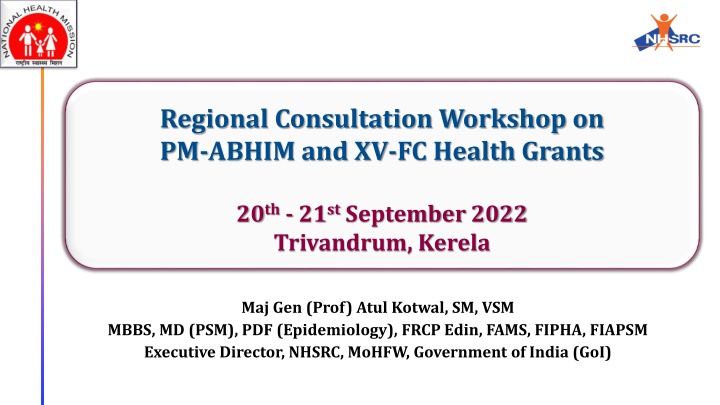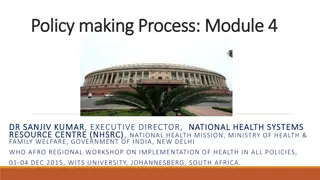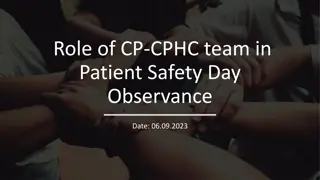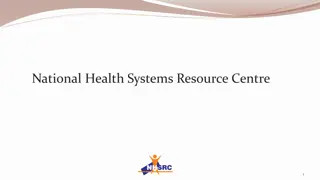
PM-ABHIM and XV-FC Health Grants Workshop Overview
Explore the key details of the Regional Consultation Workshop on PM-ABHIM and XV-FC Health Grants, including objectives, funding allocations, and focus areas for strengthening healthcare systems. Get insights into the Pradhan Mantri Ayushman Bharat - Health Infrastructure Mission and the 15th Finance Commission's contributions to urban and rural healthcare infrastructure development.
Uploaded on | 2 Views
Download Presentation

Please find below an Image/Link to download the presentation.
The content on the website is provided AS IS for your information and personal use only. It may not be sold, licensed, or shared on other websites without obtaining consent from the author. If you encounter any issues during the download, it is possible that the publisher has removed the file from their server.
You are allowed to download the files provided on this website for personal or commercial use, subject to the condition that they are used lawfully. All files are the property of their respective owners.
The content on the website is provided AS IS for your information and personal use only. It may not be sold, licensed, or shared on other websites without obtaining consent from the author.
E N D
Presentation Transcript
Regional Consultation Workshop on PM-ABHIM and XV-FC Health Grants 20th- 21stSeptember 2022 Trivandrum, Kerela Maj Gen (Prof) Atul Kotwal, SM, VSM MBBS, MD (PSM), PDF (Epidemiology), FRCP Edin, FAMS, FIPHA, FIAPSM Executive Director, NHSRC, MoHFW, Government of India (GoI)
Pradhan Mantri Ayushman Bharat - Health Infrastructure Mission (PM-ABHIM) PM-ABHIM launched by the Hon ble Prime Minister on 25th October, 2021 Largest pan-India scheme since 2005 for creation & improvement of long-term Public Healthcare Infrastructure. Total outlay of Rs 64,180 crore from FY 2021-22 till FY 2025-26.
PM-ABHIM : Objectives To develop/strengthen health systems across continuum of care to meet challenges of current and future pandemics To expand and build IT enabled disease surveillance systems To strengthen pandemic research, multi-sectoral national institutions and platform for One Health
15th Finance Commission Rs. 70,051 crores for local governments, split into urban and rural components: Urban Health Grant Rs. 26,123 Crores 37% of total funds Rural Health Grant Rs. 43,928 Crores 63% of total funds While making district wise allocations, State has to factor-in : i. Urban and rural population of the district; ii. Preferential allocation is to be made to Aspirational / Tribal / Left Wing Extremism (LWE) affected areas / Remote / Hilly districts. The funds under the 15thFC health grants should not be used by the State as the State s contribution for any CSS component or for any other mandate, apart from the components listed for the utilization of the health grants under 15th FC.
15th Finance Commission Rural Components Support for Diagnostic Infrastructure at primary healthcare facilities Conversion of rural PHCs and SHCs to HWCs Building-less SHCs, PHCs and CHCs Block Public Health Units Integrate service delivery, public health action, strengthened lab services for disease surveillance and diagnosis; Hub for health-related reporting Fully equip the rural primary healthcare facilities to provide necessary diagnostic services Convert existing primary healthcare facilities i.e. SHCs & PHCs into HWCs To address infrastructure gaps in Rural areas Out of a total of Rs 70,051 crore Rs 43,928 Crore for 28 states through Rural Local Bodies (RLBs)
15th Finance Commission Urban Components Support for Diagnostic Infrastructure at primary healthcare facilities Urban Health and Wellness Centres Enable decentralised delivery of primary health care to smaller populations, increasing the reach to cover the vulnerable and marginalised. Fully equip the urban primary health care facilities so that they can provide some necessary diagnostic services Out of a total of Rs 70,051 crore Rs. 26,123 Cr for Urban Local Bodies (ULBs)
Token to Total Approach Existing services & national institutions are being strengthened along with the creation of new institutions. Implementation of these schemes will lead to: Enhanced population coverage CPHC, CoC Linking Clinical & Public health Reducing OOPE through assured availability of drugs & diagnostics Decongestion of secondary & tertiary healthcare facilities through improved care coordination across all levels
Holistic Strengthening of the Health System Service Provision Human Resources for Health NHM Access to Essential Medicines & Diagnostics Information Systems ECRP 15th FC Grants PM ABHIM Governance Financing
Service Provision Strengthening Comprehensive Primary Healthcare: Rural and Urban HWCs - under PM-ABHIM; along with UHWCs, building-less SHCs, PHCs and CHCs and conversion of rural SHCs and PHCs to HWCs - under 15th FC local body grants. Strengthening Secondary and Tertiary level care: CHCs, Block Level Public Health Units under 15th FC grants; Critical Care Hospital blocks under PM- ABHIM; Pediatric ICUs under ECRP II. Under ECRP: Strengthening testing and labs, along with assistance for procurement of equipment and consumables.
Service Provision Strengthening Public Health Surveillance, Labs & Linkages: CS component of PM-ABHIM: 17 new point of entry health units, 15 Health Emergency Operation Centers, 2 Container based mobile hospitals; Regional NCDC, NIV. Integrated District Public Health Laboratories: Under PM-ABHIM, to serve as the apex of a network to link labs with block, state and regional public health in all districts. Block Public Health Units: Under PM-ABHIM and through 15th FC grants, Integrate service delivery, public health action, strengthened lab services for disease surveillance and diagnosis; Hub for health-related reporting
Governance and Financing PRIs and ULBs will be extensively involved in the implementation of PM-ABHIM and 15th FC health grants. Strengthening Communitization To make primary health centers as gatekeepers of the secondary and tertiary level healthcare facilities Referral Pathways Continuum of Care
OBJECTIVES OF WORKSHOP To understand the unique experiences of each State / UT To analyze experiences for understanding challenges and roadblocks To utilize this information towards streamlining the processes (incl timely fund utilization) for envisaged outputs and outcomes To provide a platform to create continuous, critical engagement of various stakeholders, including state and central government functionaries at all levels, technical institutions, experts, & development partners.
Technical Sessions For optimal utilization of funds under PM-ABHIM and 15th FC grants, ensuring extensive involvement of PRIs and ULBs is important Session on Communitization by ensuring capacity development of PRIs & ULBs for planning & monitoring . Focus is needed on skills and numbers , while planning for HRH Session on Comprehensive Planning for HRH: An integrated approach Context/State specific road blocks and bottle necks during scaling up of initiatives Session on Scaling of newer initiatives; State priorities, Challenges, Roadmap for implementation.
Technical Sessions Holistic lab networks to meet the requirements of public health surveillance and response Session on Overview of IPHL and BPHUs ; Integration of lab services (IDSP, TB, etc.) Over 86 lakh live in LMICs could be saved with a health system that provides quality healthcare, that also addresses the needs of patient safety Session on Scaling up of Quality and Patient Safety Effective and efficient reporting mechanism to track funds approved and utilized against FC-XV, PM-ABHIM, and ECRP-II components Session on Orientation and importance of NMH-PMS portal. Implementation Research to understand What Works, Where and Why .
Implementation Challenges Infrastructure Land availability for infrastructure development in urban areas is challenging Vertical growth through renovation and upgradation of existing infrastructure was suggested as a solution. Difficulty in constructing permanent infrastructure in LWE hit areas. Lack of space in facilities, lack of qualified HR for operation and maintenance of equipment. Issues in finding adequate space for BPHUs and Laboratories in the existing facilities as most of the facilities are old and renovation or expansion is difficult. States require better understanding of Brown-field projects.
Implementation Challenges HRH Availability & Rational Deployment of HR, especially specialists. Requirement of HR for project management. Supply Chain Difficulty in selection of vendors for procurement of equipment, ambulance, etc. Issue of delay in the procurement process through the GeM portal. Technology Issues with PMS portal States updated status is not reflected in the portal. Internet Connectivity challenges. Access to the NHM-PMS portal should be given to districts
Implementation Challenges Funding Allocation of more funds to urban areas compared to rural areas. Requirement for monitoring and audit of funds provided to states through multiple sources. Difficulty in monitoring facility-wise expenditure. Relaxation required w.r.t. setting up Polyclinics, since it has to be associated with UHWCs to maintain Outreach Services. Difficulty in coordination and monitoring of the Grants given to local bodies. Limited capacity of the states as of now. Flexibility required to utilize the unspent amount in the pool.
Implementation Challenges Laboratories related Issues with convergence of laboratories. Challenges related to collection and transportation of samples. Certification & Accreditation NQAS Certification of facilities to be taken up on priority. 50% facilities across the country are to be NQAS certified by 2025-26.
Implementation Detailed Guidelines shared with States/UTs. Regional Workshops being organized. Regular technical discussions and meetings organized between NHSRC and Development Partners. NHSRC and DPs available for technical support, as require. No approval required from NHSRC or Development Partners for infrastructure layouts and designs prepared by States /UTs.
Information and Monitoring PMS portal: To assess the extent of development of healthcare infrastructure - district and state wise. To assess the utilization of funds provided under various sources like PM- ABHIM, ECRP, etc. To utilize this information for identification and management of bottlenecks in implementation, analysis of how a program is running and challenges faced To work more on problematic areas/ low-lying districts with a focused approach.
Priorities Expediting the implementation and utilization of funds of PM-ABHIM, FC-XV and ECRP-II in a time bound manner. State should undertake a gap assessment to ensure the optimal utilization of resources. Expediting the tendering of components under PM-ABHIM and FC-XV. Creation of Public Health Management Cadre (PHMC) for ensuring the availability of health management, public health and specialists personnel. States should prioritize development of District Health Action Plans (DHAPs). NHSRC will develop NQAS Guidelines for DH being converted to Medical Colleges, and Quality Assessment tool for SDH. Ownership and collaboration efforts required from senior officials for the improvement of facilities and integration of programmes under one umbrella. Engagement and training of PRIs and ULBs should be prioritized for implementation of FC-XV components.



